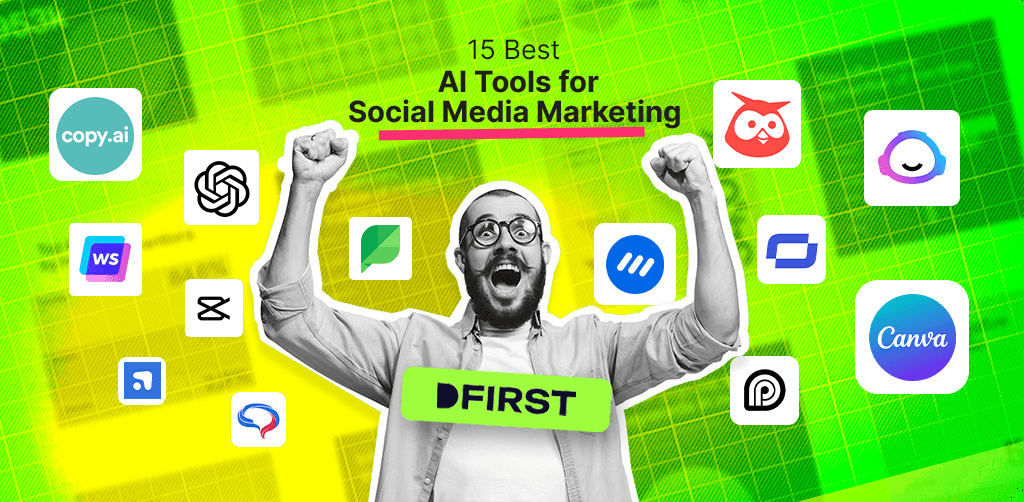After years as Digital First AI, we are happy to announce our rebrand to DFIRST AI. This rebranding reflects our expanded focus on AI-driven creative tools and our commitment to new possibilities for creators everywhere. Try our new platform for free.
I’ve Tried 12 AI Advertising Tools {Free Trials and No Code}
Review and compare the top 12 AI advertising tools with free trials and no-code options, including DFIRST AI, Arcads, and HeyGen.
Sonu kalwar
Share:
Stale ads and guesswork can drain your ad budget. This slows your growth.
Today's AI advertising tools solve these common problems. They help you:
→ Create and test new ads fast
→ Manage bids and budgets automatically
→ Get a clearer picture of what's really driving results
→ And they predict spending and returns, plus reduce risks like fraud or brand safety issues
This means you can launch fresh ads quicker. You gain better control. Personalization works while keeping privacy safe. And all your ad channels work together more smoothly.
Many businesses already use these tools. Think Ecommerce, Apps, Travel, and Media. More and more teams in CPG, Finance, Telecom, and B2B are adopting them too. They're moving from manual tasks to always-on optimization.
Here are 12 AI advertising tools. They help you run more tests, waste less money, and grow with more confidence.
I've kept this practical. So you can pick what fits your current setup, budget, and goals.
DFIRST AI
DFirst is a visual, AI‑powered marketing suite that turns ad ideas into production‑ready assets fast. Build workflows on a drag‑and‑drop canvas that connect copywriters, image/video generators, researchers and scrapers. Launch high‑performing ads—copy, designs, and short videos—in hours, not weeks.
Why I Use DFIRST
Why I choose Unlike single‑purpose ad tools, DFIRST unifies research, creative, and execution in one canvas. I can scrape competitors, draft copy in brand voice, generate on‑brand visuals and video variants, then iterate with data—all inside reusable workflows my team can scale and automate.
Let’s take a deeper look at what DFIRST has to offer:
Feature #1: Visual Workflow Builder

Visual Workflow Builder Design end‑to‑end ad pipelines on a whiteboard canvas. Drag nodes for research, copy, image, video, and scrapers; connect inputs/outputs; hit Generate per step. Reuse templates, group nodes, add notes, and branch A/B paths for hooks, CTAs, formats. Left‑to‑right flow preserves context, while per‑node settings (model, prompt, tokens) give creative and cost control. Collaborate in projects/workspaces and duplicate workflows to spin up new campaigns in minutes.
Feature #2: Research Built In
Market Research Plug in Perplexity, Google Search, Web Searcher and Deep Research to collect stats, news and citations. Use social scrapers (Instagram, YouTube, LinkedIn, Reddit, Facebook) plus sitemap and deep web crawlers to mine competitors’ messaging, offers and creatives. Feed findings straight into copy nodes to craft angles, objections and proof. Build audience insights, identify content pillars, and validate propositions before producing ad assets.
Feature #3: Visuals & Copy Production
Draft headlines, primary text and CTAs in your brand voice across Meta, Google, X, LinkedIn and TikTok with text models (Open AI, Claude, Grok & Gemini).
Image nodes (DALL·E, Flux, Stable Diffusion, Ideogram, Recraft) generate product shots, UGC‑style creatives, and typography‑heavy banners.
Video nodes (Kling, Veo) turn scripts or images into short ad clips for Reels/Shorts. Auto‑version by audience, offer, or format, and keep consistency with brand guidelines stored in your context.
Feature #4: 50+ AI Model
Access a broad model library across text (GPT, Claude, Gemini, Grok, reasoning series), image (DALL·E, Flux, Stable Diffusion, Ideogram, Recraft), video (Kling, Veo), and research (Perplexity). Smart routing selects models for speed, cost, or context length, with automatic fallbacks for uptime. Mix fast “mini” models for ideation and premium models for final production.
AI Text Models
Name | Purpose | |
|---|---|---|
Claude |  | Text Generation |
GPT |  | Text Generation |
Gemini |  | Text Generation |
Grok |  | Text Generation |
Graphic & Video Models
Name | Purpose | |
|---|---|---|
Sora |  | Video generation |
Stable Diffusion |  | Image generation & more |
Flux |  | Image generation |
Dalle |  | Image generation |
Luma Video |  | Video generation |
Ideogram |  | Image generation |
Scraper
Name | Purpose | |
|---|---|---|
LinkedIn scraper |  | Scrape profiles, posts & more |
Instagram scraper |  | Scrape profiles, posts & more |
Facebook scraper |  | Scrape profiles, groups & more |
Youtube scraper |  | Scrape videos, thumbnails & more |
Twitter / X scraper |  | Scrape profiles, posts & more |
TikTok |  | Scrape videos, thumbnails & more |
Website Scraper |  | Collect text from urls |
Spider crawler |  | Collect web info |
Sitemap extractor |  | Collect pages from sitemaps |
Researcher
Name | Purpose | |
|---|---|---|
Google Researcher |  | Collect search results |
Company Researcher |  | Collect company info |
Agent Researcher |  | Collect insights |
Deep Research |  | Collect deep insights |
Feature #5: Data Room Centralize Brand Asset
Upload PDFs, DOCX, CSV, PPTX, MD, audio, video, and URLs (plus YouTube). The platform chunks and summarizes files to build company, product and audience context used by every node, so ads stay on‑brand. Enterprise‑grade security: OAuth2, MFA, RBAC, encryption in transit/at rest, backups, and no training on your private data by default.
Feature #6: Whiteboard
Each campaign lives in a dedicated whiteboard orchestrated by an AI Agent. Share your brief, website and assets; the agent proposes a step‑by‑step plan, then auto‑builds nodes for research, strategy, copy, visuals and handoff. Edit in place, branch tests, and generate final summaries. Duplicate winning boards to scale across markets, products and channels with consistent best practices.
Pros & Cons
Pros:
End‑to‑end ad production (research → copy → visuals → video) in one place
Visual builder with reusable templates accelerates time‑to‑launch
Large, multi‑vendor model library with smart routing/fallbacks
Powerful scrapers for competitor and UGC insights
Strong data ingestion and security via the Data Room
Cons:
Needs internet or Wi-Fi access to work
Best features need Pro plan
Pricing
Free: 80 tokens daily • Starter: $39/month (unlimited tokens, 3 projects) • Pro: $199/month (unlimited everything) • Enterprise: Custom pricing
Support
You receive 24/7 support regardless of your organization size. You also gain access to templates, a help center, guides, and instructional videos to improve your productivity and ROI.
Generate your first flow for free - no credit card required
Lovart.ai

Lovart.ai operates as an AI design agent that coordinates multiple specialized AI models to create complete marketing campaigns. I found the platform takes a single creative brief and produces an entire suite of assets including logos, marketing materials, and videos.
The tool integrates several AI models for different tasks. ChatGPT handles copywriting, Gemini manages research, Flux creates photorealistic images, and Ideogram generates text-based designs. This multi-model approach delivers more comprehensive results than single-purpose tools.
Key features include:
Automated campaign planning from brief descriptions
Professional export formats (PNG, SVG, PSD)
Specialized modules for menus, price lists, and catalogs
Brand character creation with consistent styling
Video generation with lip-sync capabilities
The platform uses a credit-based pricing system. The free tier provides 500 daily credits that refresh every 24 hours. The Pro plan costs approximately $90 monthly for around 11,000 credits.
I noticed Lovart.ai excels at structured business documents like restaurant menus and product catalogs. The platform applies design psychology principles automatically to these materials.
Advantages:
Orchestrates multiple AI models in one workflow
Strong at business-ready marketing materials
Generous free tier for testing
Professional export options
Limitations:
May require manual refinement for brand perfection
Video specifications lack clear documentation
Credit consumption varies significantly by task complexity
Currently designed for single users only
The platform launched globally in 2025 and targets solo marketers, small businesses, and non-designers seeking agency-quality results.
Recraft.ai
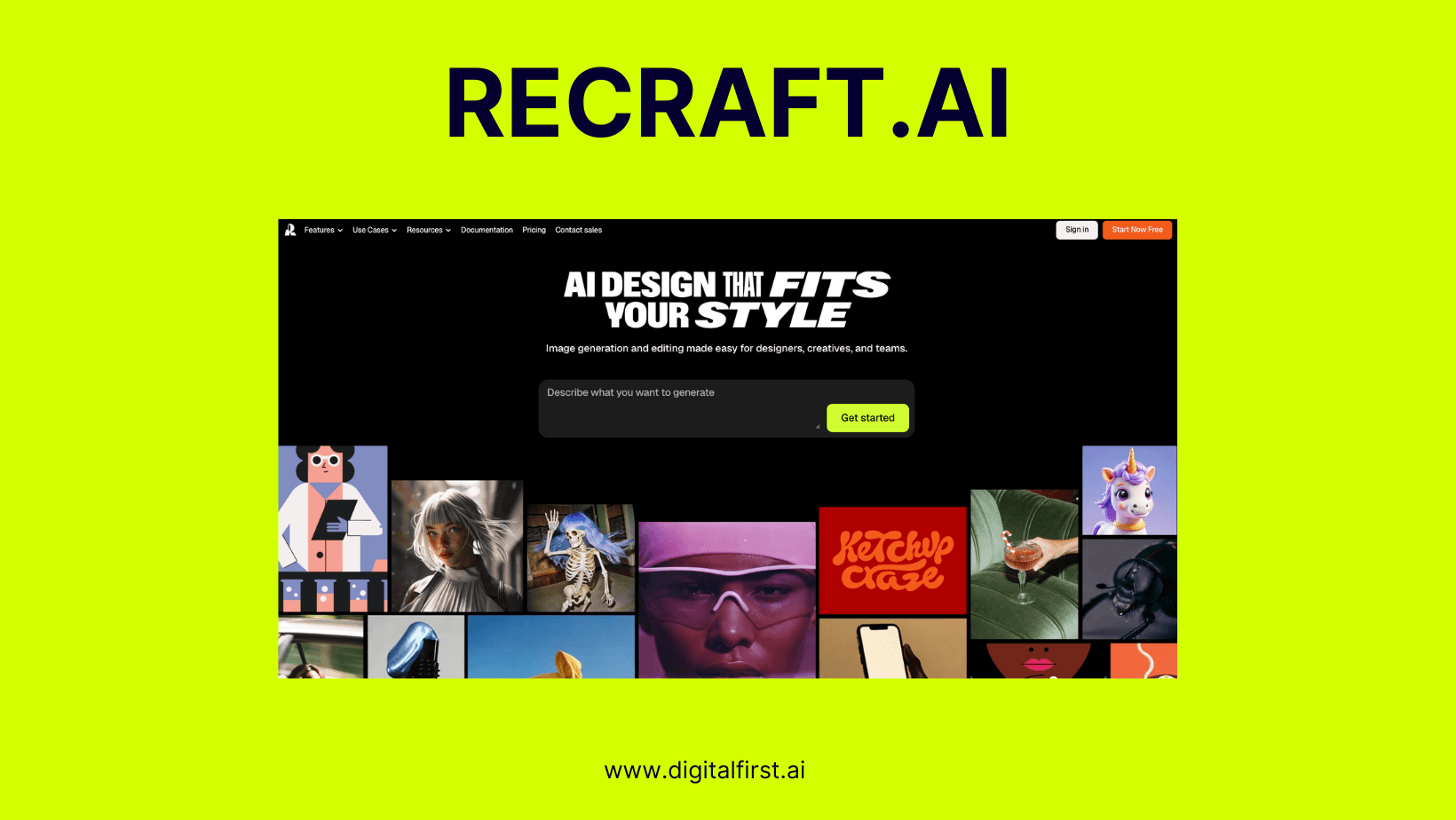
Recraft.ai stands out in the crowded AI design market. The platform focuses heavily on vector image generation alongside standard raster image creation.
Vector Graphics Excellence
Recraft excels at generating true scalable vector graphics in SVG and Lottie formats from text prompts. I can create logos, icons, and illustrations that resize without quality loss.
This vector capability separates Recraft from most AI image generators that only produce raster images. The scalable graphics work perfectly for web design and branding projects.
Brand Consistency Features
The platform includes powerful brand style controls. I can save custom color palettes and style settings to maintain consistent visual branding across all generated assets.
This brand consistency feature addresses a major challenge in AI-generated marketing materials. Most other tools struggle to maintain visual coherence across multiple designs.
Comprehensive Editing Suite
Recraft provides 5 essential AI editing tools:
Modify Area & Inpainting - Edit specific image sections with new prompts
AI Eraser - Remove unwanted objects seamlessly
Background Remover - Isolate subjects from backgrounds
Image Upscaler - Enhance resolution without quality loss
Image Vectorizer - Convert raster images to vectors
User Experience
The digital canvas interface makes iteration simple. I can duplicate images, compare versions side-by-side, and refine designs efficiently.
Over 3 million users across 200 countries use Recraft. Major companies like Netflix, HubSpot, and Ogilvy rely on the platform for their design needs.
Current Limitations
Text rendering within images remains problematic. The AI struggles with accurate text placement and formatting in generated designs.
Anatomical errors occasionally appear in human figures. Complex prompts sometimes produce unexpected results requiring regeneration.
Predis.ai
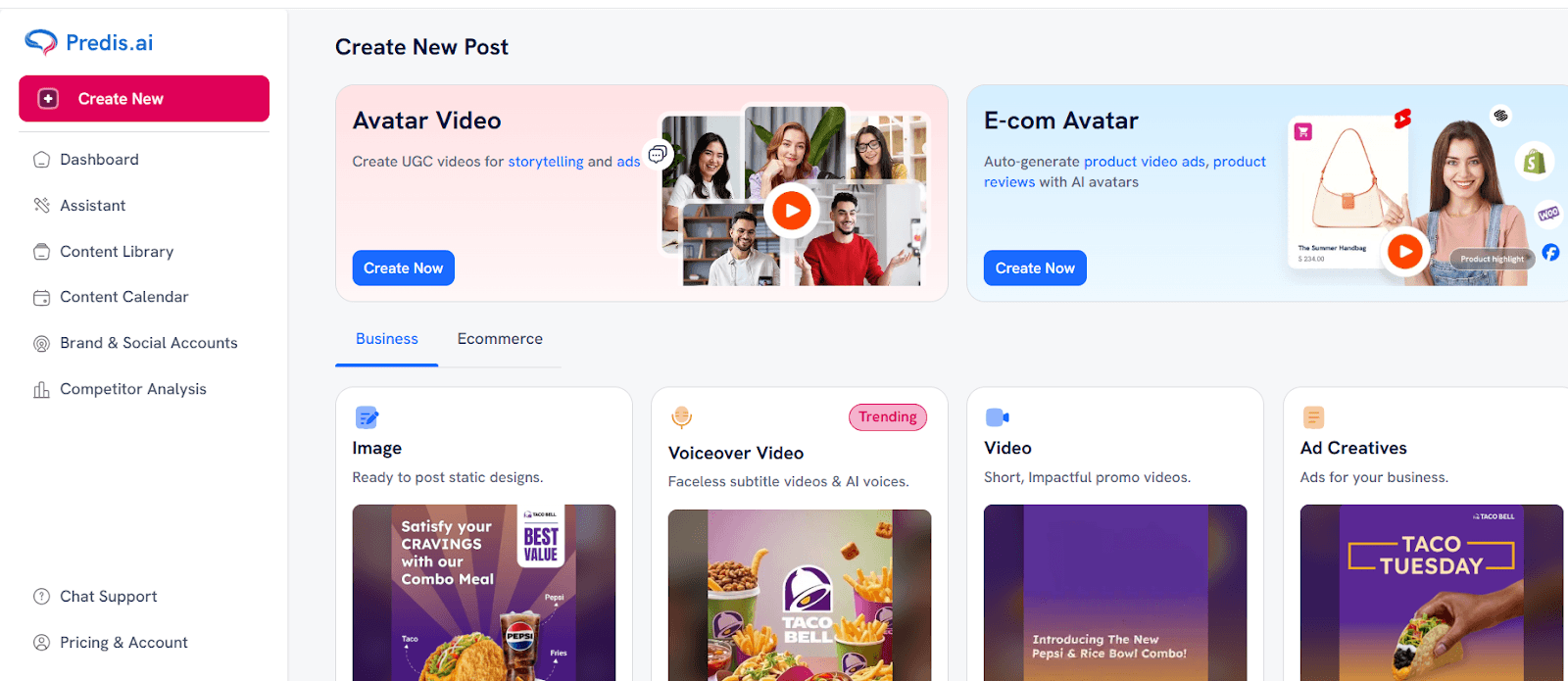
Predis.ai is an AI-powered social media and ad generator that creates visuals, videos, captions, headlines, and calls-to-action from simple text prompts or product inputs. It streamlines the ad creation process, enabling marketers, solopreneurs, and small businesses to produce complete campaigns quickly without needing multiple tools.
The platform combines multiple AI capabilities, including copywriting, video and image generation, brand styling, and analytics, making it an end-to-end solution for social campaigns. Users can generate ads optimized for engagement, A/B test variations, and schedule content directly to major social media platforms.
Key Features
Generate static and animated ad creatives, product videos, and UGC-style clips
Automated copywriting: headlines, captions, calls-to-action
Brand consistency with automatic application of colors, fonts, logos, and tone
Multi-language support for global campaigns
Built-in workflow and scheduling tools to post across major platforms
The platform uses a credit-based subscription model tailored for individual creators, small businesses, and agencies. Each plan provides a set number of credits, which are consumed depending on the type and complexity of the content generated. 7-day free trials are available for new users to explore the platform.
Higher-tier plans provide additional credits and advanced features, including multi-brand support, extended scheduling, and analytics tools. Video and rich media assets consume more credits than simple image or text-based ads, so users can scale their usage according to campaign needs.
Advantages
End-to-end solution for creating social media and ad campaigns from copy to video
Maintains brand consistency across all ad assets
Supports multi-platform campaigns and multi-language content
Streamlines workflow with built-in scheduling and content calendar tools
Limitations
Some advanced features are only available in higher-tier plans
Output may require manual refinement to perfectly match niche brand voices
Predis.ai is an AI-driven platform that automates the creation of social media posts, ad visuals, videos, and copy, helping marketers and small businesses produce campaigns quickly and efficiently. It’s built for solo marketers, small businesses, and non-designers who want professional-quality results.
Arcads
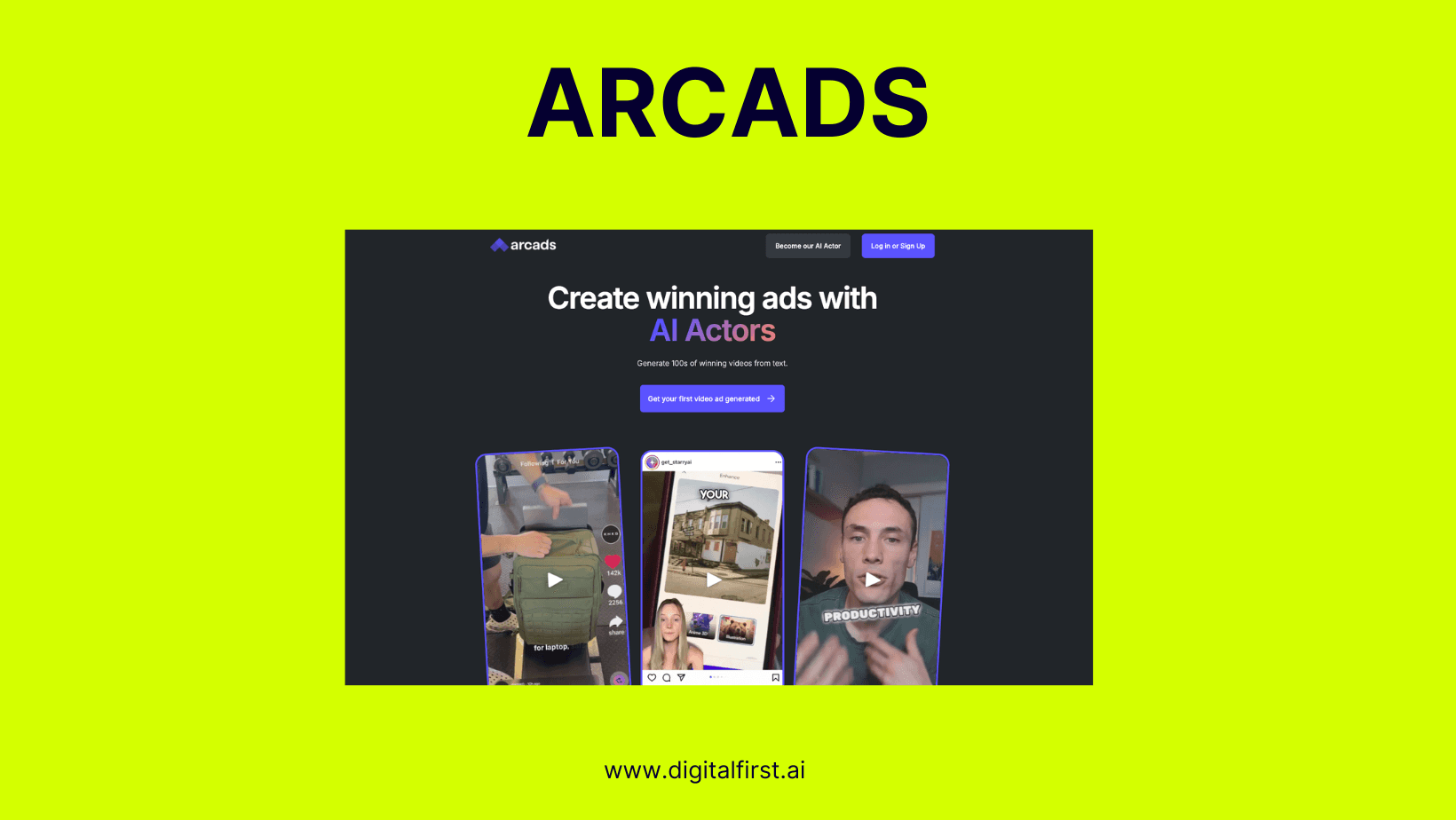
Arcads is an AI-powered video creation platform that transforms text scripts into user-generated content style ads. This tool specifically targets performance marketers and e-commerce brands who need high-volume video content quickly.
The platform offers over 300 AI actors representing different ages, ethnicities, and backgrounds. These digital avatars deliver your script in approximately 2.5 minutes per video generation.
Key Features:
AI UGC Generator - Creates authentic-looking video ads from text input
Bulk Creation - Generates dozens of ad variations simultaneously
Multilingual Support - Supports 35 languages for global campaigns
Rapid A/B Testing - Enables quick testing of different scripts and actors
The pricing structure uses a credit-based monthly subscription model:
Plan | Monthly Cost | Video Limit | Cost Per Video |
|---|---|---|---|
Starter | $110 | 10 videos | $11.00 |
Creator | $220 | 20 videos | $11.00 |
Pro | Custom | Custom | Custom |
Arcads delivers raw video footage rather than finished ads. You need external video editing software to add music, text overlays, and other elements.
The platform works best for marketing teams with existing video editing capabilities. Small businesses without editing skills may find the workflow challenging.
Arcads excels at replacing expensive human UGC creators who typically charge $80-200 per video. The tool speeds up creative testing cycles significantly compared to traditional video production methods.
HeyGen

HeyGen is the most impressive AI video creation platforms available today. The tool uses artificial intelligence to generate realistic avatars and professional-quality videos without needing cameras or actors.
Key Features
AI Avatars: Over 1,000 pre-made avatars plus custom avatar creation
Video Translation: Supports 175+ languages with lip-sync technology
Voice Cloning: Creates digital copies of real voices
Text-to-Video: Generates complete videos from written scripts
The platform offers multiple avatar options. I can use stock avatars, create custom ones from photos, or build video avatars that mimic specific people's appearance and mannerisms.
HeyGen's Pricing Structure:
Plan | Monthly Cost | Key Features |
|---|---|---|
Free | $0 | 3 videos/month, 720p quality |
Creator | $24 | Unlimited videos, 1080p quality |
Team | $30/seat | 4K resolution, collaboration tools |
Enterprise | Custom | Advanced security, API access |
The video translation feature stands out as particularly powerful. I can translate existing videos into different languages while maintaining the original speaker's voice tone and ensuring accurate lip-syncing.
User feedback reveals both strengths and concerns. Most reviews praise the exceptional video quality and ease of use. However, some users report issues with pricing transparency and customer service responsiveness.
The platform works well for marketing teams, trainers, and content creators who need to produce videos quickly. The brand kit feature helps maintain consistent branding across all video content.
Insense.pro
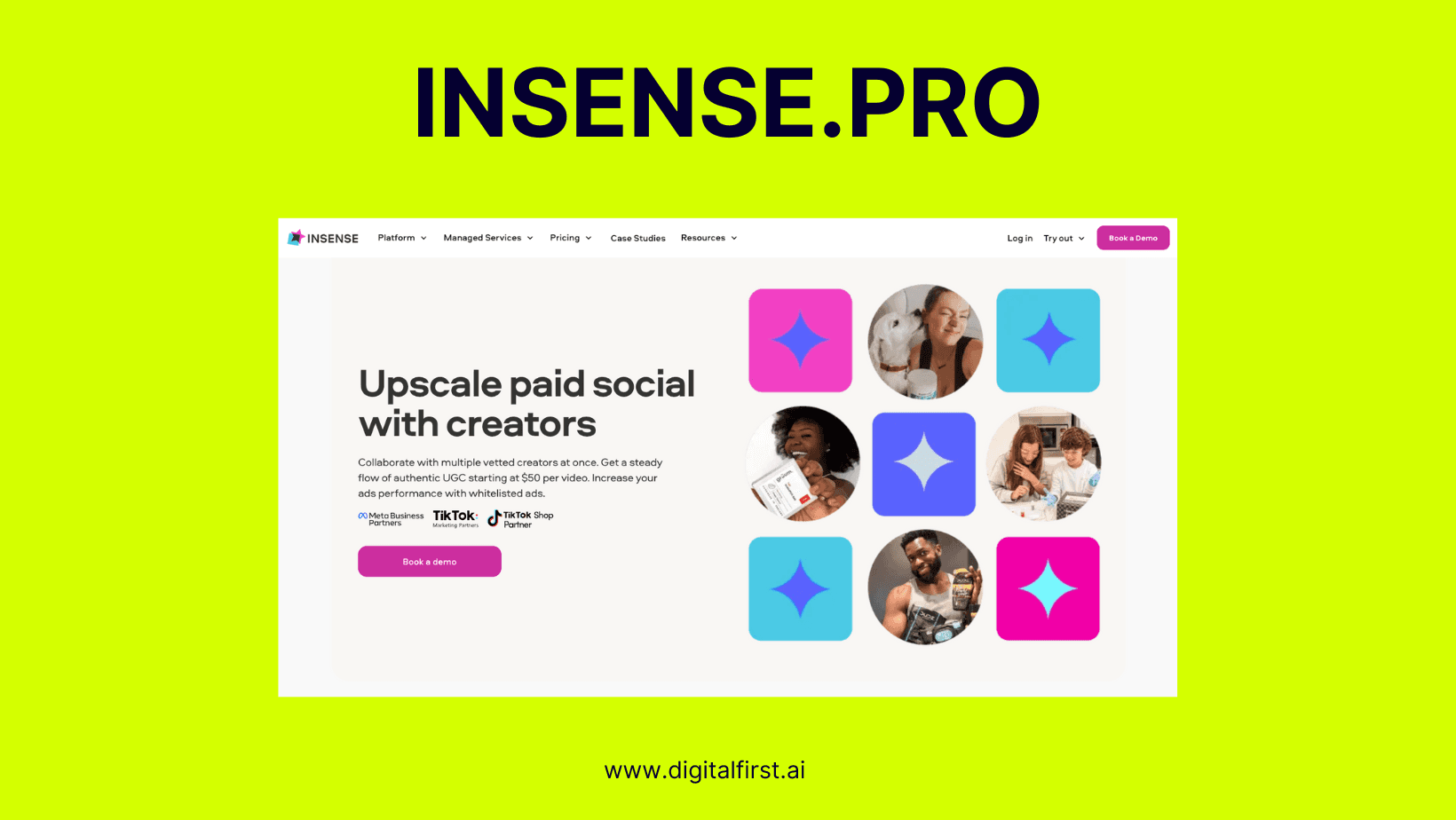
Insense.pro is a creator marketing platform that connects brands with content creators for social media campaigns. The platform specializes in user-generated content and influencer marketing.
Core Features
Creator marketplace with vetted content creators
Campaign briefing and management tools
Payment processing system
Performance tracking dashboard
Meta and Snapchat Ads integration
I can access over 70,000 creators through their marketplace. Each creator profile shows audience demographics, engagement rates, and follower counts.
Campaign Types Available
Campaign Type | Description |
|---|---|
Just Content | Content creation only |
Content with Posting | Creation plus social media posting |
Creator Licensing | Whitelisted ads using creator accounts |
The platform handles three main campaign workflows. I can request content creation, have creators post to their accounts, or run whitelisted ads through creator profiles.
Pricing Structure
$500 monthly subscription (billed quarterly)
15-20% service fee on creator payments
Separate budget needed for creator compensation
I need to maintain account balance to pay creators. The quarterly billing model offers more flexibility than annual contracts from competitors.
Strengths I've Observed
Complete campaign management in one platform
Direct ad platform integrations
Dedicated customer support
Vetted creator network
Notable Limitations
Creator complaints about low compensation rates
Interface can feel cluttered during campaign management
High total costs when combining subscription plus service fees
The platform works best for e-commerce brands running consistent creator marketing campaigns.
Albert.ai by Zoomd
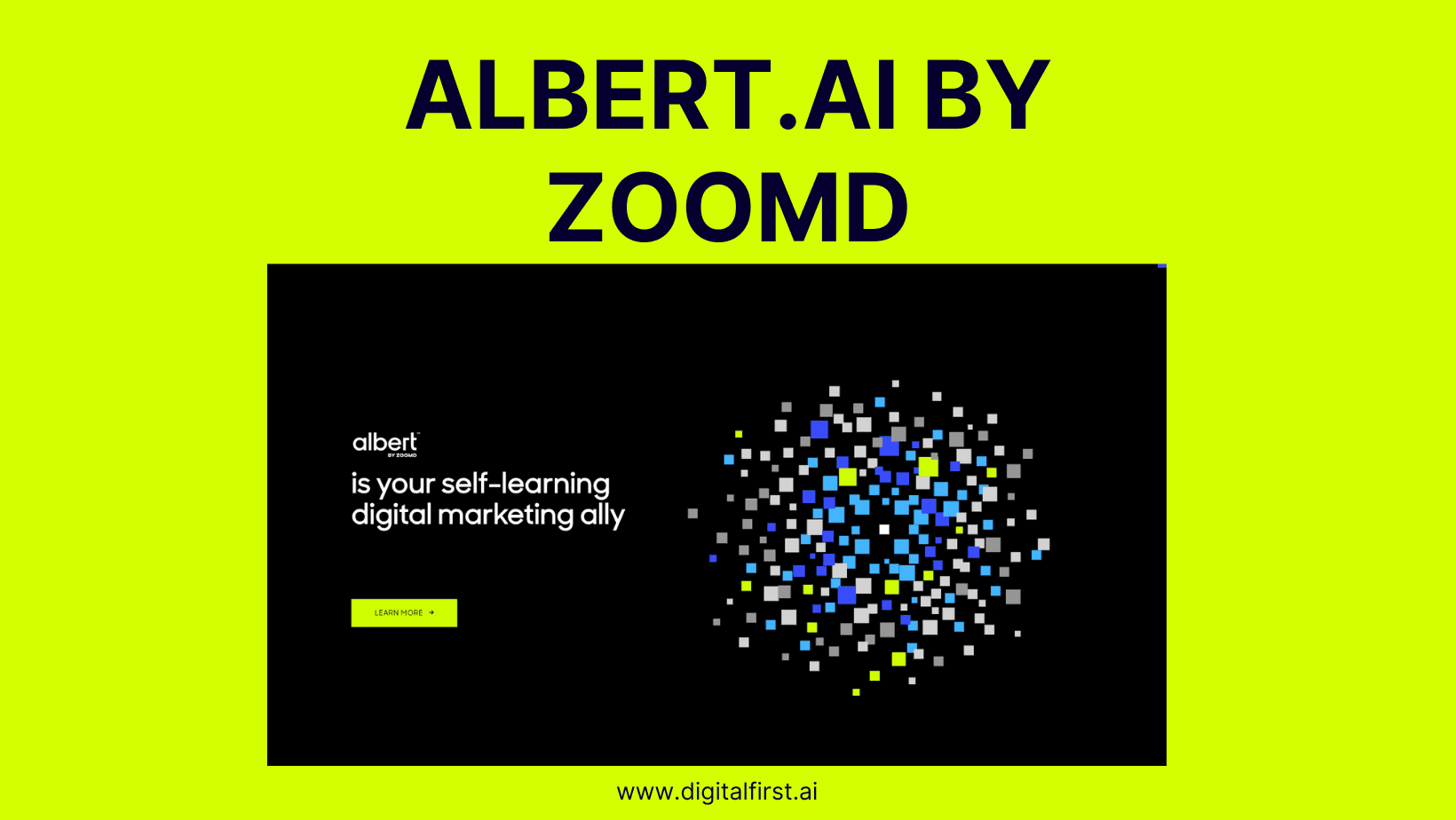
Albert.ai is the most advanced autonomous marketing platforms for enterprise-level advertisers. This AI-powered tool manages digital advertising campaigns across multiple channels without constant human supervision.
Key capabilities include:
Cross-platform campaign management (Google Ads, Meta, programmatic)
Real-time budget allocation between channels
Autonomous bidding strategy adjustments
Creative asset testing and optimization
Audience segment discovery and targeting
Albert.ai excels at processing thousands of data signals simultaneously. The platform shifts ad spend automatically when it detects performance opportunities across different channels.
Target Market and Pricing
The platform targets businesses with substantial advertising budgets, typically starting at $100,000 annually. Zoomd offers customized pricing based on company size and yearly ad spend rather than fixed subscription plans.
I notice this pricing model makes Albert.ai accessible primarily to large enterprises and agencies. Small businesses will find the entry point too high for their budgets.
Performance Results
Case studies show impressive results from Albert.ai implementation:
800% return on ad spend through creative optimization
16.3% improvement in YouTube ROI for CPG marketers
Automated testing of over 11,000 creative combinations
Platform Integration
Albert.ai integrates with major advertising platforms including Google Ads, Meta Business Manager, TikTok Ads Manager, and Bing. This allows unified campaign management across all channels from a single dashboard.
The platform requires strategic oversight to maximize effectiveness, making it best suited for experienced marketing teams.
Motionapp

I've found that Motionapp can confuse people because they offer two different products. The one I'm covering here is their creative analytics platform for advertising teams, not their productivity tool.
What Motionapp Does
The platform pulls ads from Meta, TikTok, YouTube, and LinkedIn into visual reports. It groups similar ads together so I can see how concepts perform overall instead of looking at individual ads.
The AI analyzes my ad account history and tells me what to create next. It's trained on billions in ad spend from other brands.
Key Features I Use
Visual reporting that shows creative assets with performance data
Frame-by-frame video analysis to see where viewers drop off
AI agents that audit my account and track competitor ads
Advanced filtering with over 200 metrics and custom conversions
Integration with attribution tools like Northbeam and GA4
Pricing and Plans
Motionapp doesn't show pricing publicly for their creative analytics tool. They offer a 14-day free trial. One user mentioned the monthly fee is "one of our bigger line items" but worth the cost.
What Users Say
The platform has a 4.6/5 rating on G2. Users save hours on reporting tasks that used to take manual work in spreadsheets.
Pros:
Saves significant time on creative reporting
Makes data visual for creative teams
Excellent customer support
Deep insights with AI recommendations
Cons:
No public pricing information
Steep learning curve for new users
Limited integrations with some tools
No automated report scheduling
The platform works best for performance marketing teams who need to analyze large volumes of creative data and want AI-powered insights for their next campaigns.
Optmyzr

Optmyzr is a comprehensive PPC management platform that helps me automate and optimize Google Ads, Microsoft Ads, and Amazon advertising campaigns. The platform uses AI and machine learning to streamline campaign management tasks.
Key Features:
One-Click Optimizations: I can implement data-driven suggestions for keywords, bids, and ad copy with a single click
Rule Engine: Custom automation workflows manage campaigns without coding knowledge
Enhanced Scripts: Pre-built scripts automate complex Google Ads tasks
Bid Management: Advanced bidding tools based on ROAS and CPA goals
Reporting Tools: Automated, customizable reports with detailed analytics
The platform saves significant time on manual tasks. I can focus on strategy while Optmyzr handles repetitive optimizations.
Pricing Structure:
Plan Type | Starting Price | Best For |
|---|---|---|
Basic | $208/month (annual) | Small agencies |
Scaling | Custom pricing | Growing businesses |
Enterprise | Custom pricing | Large accounts |
Optmyzr offers a 14-day free trial. Pricing increases based on monthly ad spend and account numbers.
User Experience: The platform receives high ratings on review sites. Users praise its time-saving automation and excellent customer support. Common concerns include the learning curve for new users and higher pricing compared to basic tools.
I maintain full control over all automated changes. The platform suggests optimizations but requires my approval before implementation.
Jacquard
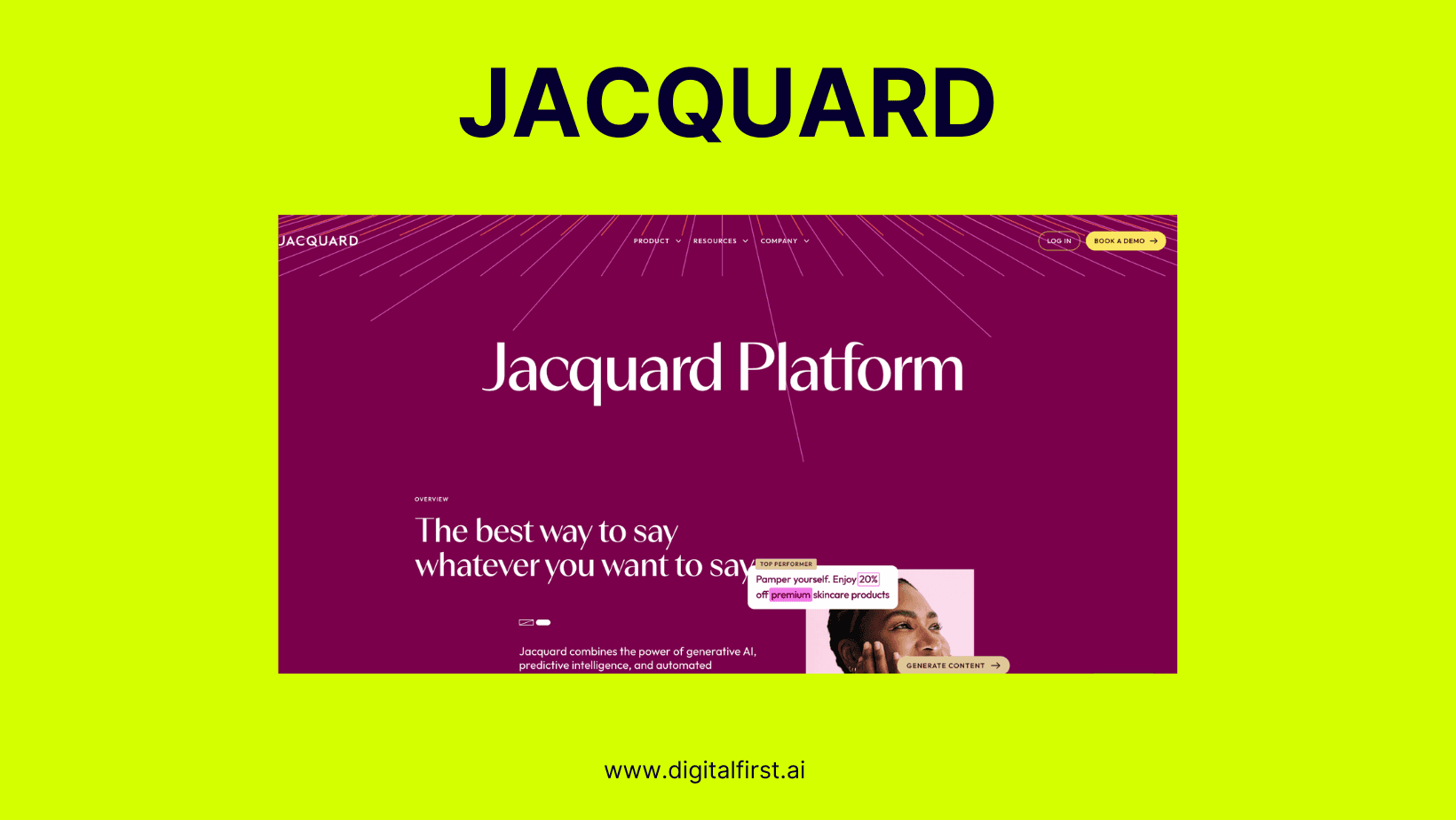
Jacquard is an enterprise AI platform I've found specifically designed for brand messaging at scale. The platform generates high-performing content for email, SMS, and push notifications while maintaining brand compliance.
Core AI Technology
Jacquard operates on four proprietary engines that work together:
Language Generation Engine - Creates thousands of message variants from one brief
Predictive Performance Engine - Forecasts winning messages using 60 billion data points
Contextual Engine - Personalizes messages based on user behavior and attributes
Optimization Engine - Tests variants dynamically to prevent ad fatigue
Key Performance Features
The platform delivers impressive automation capabilities. It generates up to 2,500 message variants in 30 seconds with 88% autonomy levels.
I noticed Jacquard provides a median 9.7% click uplift for predicted winners. This rises to 19% when combined with testing strategies.
Enterprise Focus
Jacquard targets large consumer brands exclusively. The platform requires no prompt engineering from users, instead using guided workflows for content creation.
Brand Safety Controls
The system combines creative AI with rule-based filters. This ensures all generated content matches brand voice, tone, and compliance requirements automatically.
Pricing Structure
Jacquard uses enterprise-only pricing with custom quotes. Companies must contact their sales team directly for cost information.
Optimove
Optimove is an AI-powered customer data platform that helps businesses create personalized marketing campaigns. I find it particularly useful for companies that want to move beyond basic email blasts to truly customized customer experiences.
The platform combines customer data from multiple sources into one clear view. This unified approach lets me see each customer's complete journey across different touchpoints.
Key AI-powered features include:
Smart segmentation - automatically groups customers based on behavior patterns
Predictive analytics - forecasts which customers might churn or make purchases
Real-time personalization - adjusts website content instantly for each visitor
Multi-channel orchestration - manages campaigns across email, SMS, push notifications, and apps
The platform's OptiGenie AI serves as the intelligence layer. It powers predictive modeling and generates personalized content without requiring multiple disconnected tools.
Optimove focuses on maximizing customer lifetime value rather than just immediate sales. The AI continuously optimizes campaign timing, frequency, and content based on individual response patterns.
The platform works well for e-commerce, gaming, retail, and travel companies. These industries benefit most from its retention marketing capabilities and data-driven automation features.
Pricing structure:
Custom pricing based on traffic volume
Cost depends on number of personalized elements
Enterprise-level investment required
Users consistently rate Optimove highly on review platforms like Gartner (4.9/5) and G2 (4.6/5). The main praise centers on its powerful personalization capabilities and excellent customer support team.
Madgicx
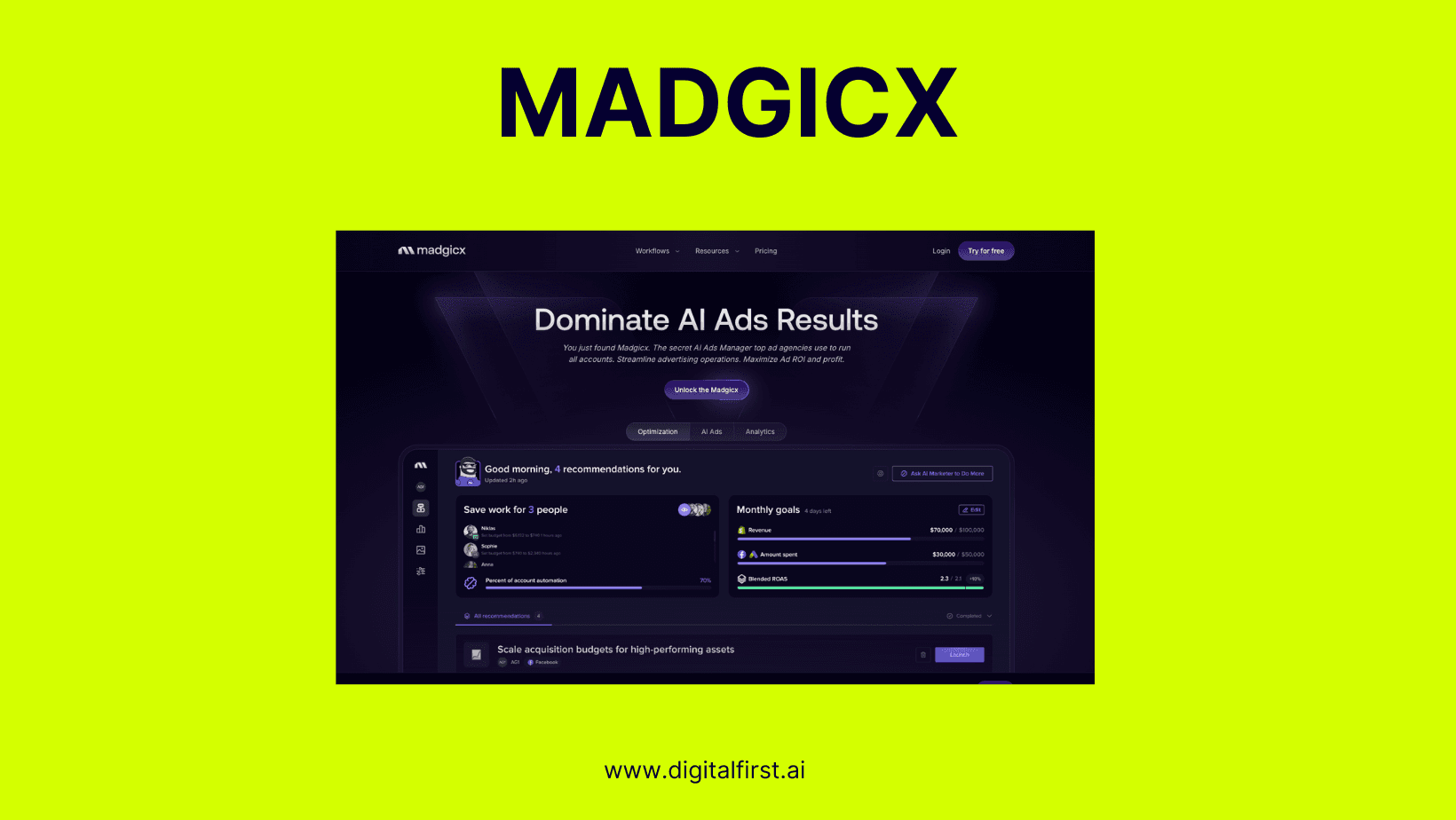
I've found Madgicx to be a comprehensive AI platform built specifically for Facebook and Instagram advertising. The tool positions itself as an autonomous media buyer that handles campaign optimization without constant manual oversight.
Core AI Features
The platform's AI Marketer acts as my personal advertising assistant. It reviews my ad accounts daily and provides specific recommendations like pausing weak ads or redistributing budgets.
I can use the AI Ad Generator to create new ad images from my existing content. The tool offers multiple creative styles and includes an AI editor for modifying generated ads.
Key Automation Capabilities
Budget optimization across age groups and demographics
Audience segmentation based on user behavior patterns
Creative rotation that adapts to performance data
Performance tracking with unified dashboard reporting
Pricing Structure
Madgicx starts at $58-72 monthly for basic ad spend levels. Higher spend accounts require in-app pricing consultation.
The platform offers these additional services:
Tracking Pro: $49/month for advanced attribution
Auto Ads: $399/month for 30 AI-generated ad packages
User Experience Concerns
I've noticed mixed feedback from the advertising community. Some marketers praise the time-saving automation features and data-driven insights.
However, multiple users report billing issues after the 7-day free trial. Many describe unexpected charges and difficult refund processes that create financial risks.
The platform requires significant learning time due to its comprehensive feature set and complex interface.
AdCreative AI
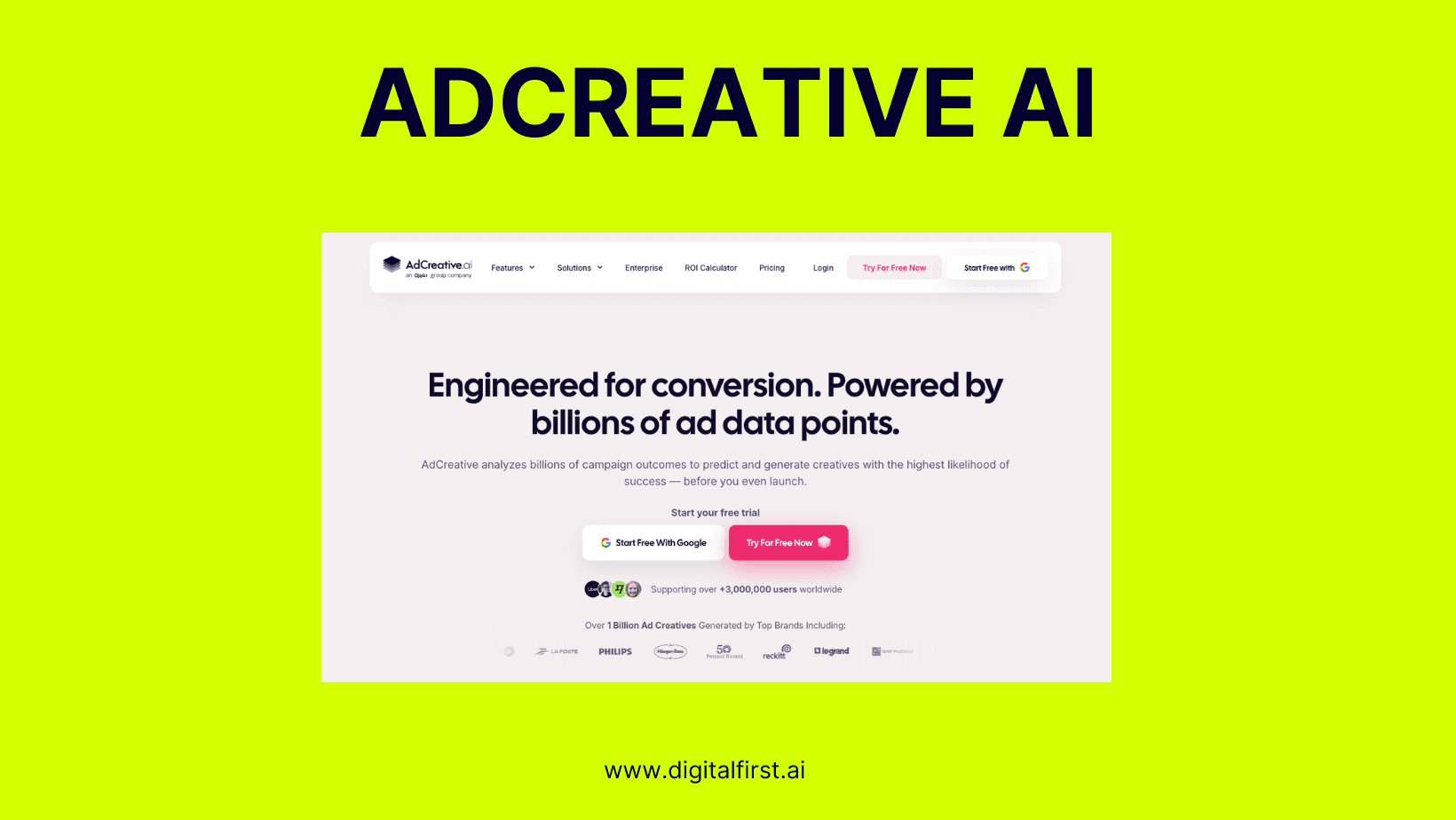
AdCreative AI is a platform that uses artificial intelligence to create ad banners, social media posts, and marketing copy. The tool focuses on helping businesses make lots of ad versions quickly.
Key Features:
AI ad generation - Creates hundreds of ad designs in seconds
Performance scoring - Rates each ad from 1-100 for predicted success
Text generation - Writes headlines and ad copy automatically
Brand consistency - Applies your logo, colors, and fonts to all ads
Multi-platform sizing - Makes ads in all standard sizes for different platforms
Plan Type | Monthly Price | Downloads Included |
|---|---|---|
Startup | $29-$39 | 10 |
Professional | $139-$209 | 50+ |
Agency | $549+ | Higher volume |
The platform works in three simple steps. First, you upload your brand assets like logos and colors. Next, you pick ad sizes and add text. Finally, the AI creates multiple ad variations.
Benefits:
Fast ad creation process
Easy-to-use interface
Good for testing many ad versions
Maintains brand look across ads
Common Complaints: Many users report billing issues after canceling free trials. Others find the ad quality generic and repetitive. Some say the ads don't perform better than manually created ones.
The tool offers a 7-day free trial. However, I recommend reading user reviews carefully before signing up, especially regarding billing practices and cancellation policies.
Pencil AI

I found Pencil AI stands out as a comprehensive advertising platform that handles the entire creative workflow. It generates complete static and video ads rather than just text or images like other AI tools.
Core Features:
AI Ad Generation: Creates thousands of new ad variations in minutes using your brand assets
Performance Prediction: Uses machine learning trained on $1 billion in ad spend data to predict winners
Integrated Editor: Drag-and-drop interface for real-time editing without design skills
Campaign Analytics: Connects to media accounts for AI-driven performance insights
Brand Compliance: Automatically applies brand guidelines to all generated content
Pricing Structure I Found:
Plan | Monthly Cost | Annual Cost | Generations |
|---|---|---|---|
Core | $14 | $11 | 50 |
Growth | $55 | $44 | 250 |
Pro | Custom | Custom | Unlimited |
User Experience Highlights:
Pencil AI receives a 4.8/5 rating on G2 reviews. Users praise the platform's speed and performance quality. I noticed customers appreciate the dedicated support team that acts as creative partners.
Key Limitations:
The platform requires high-quality input assets to produce effective results. Some users report the interface feels clunky at times. Generated ads may need minor edits before launching campaigns.
Best For:
Marketing teams, agencies, and businesses wanting to scale creative output quickly. The platform works well for Meta and TikTok advertising campaigns specifically.
Comparative Analysis And Strategic Recommendations
I've analyzed the leading AI advertising tools across two main categories to help you make informed decisions. Each tool serves different business needs and skill levels.
AI Video Creative Platforms
These tools split into two distinct approaches. Complete solutions offer end-to-end video creation with realistic avatars and intuitive editing features. Users get finished videos without technical skills.
Specialized tools focus on generating raw AI actor footage. They require external video editing capabilities to produce final advertisements. This approach suits marketing teams with in-house editors who want cost-effective alternatives to human talent.
AI Image and Ad Creative Platforms
This category shows significant variation in capabilities and reliability. Four main approaches emerge:
Tool Type | Best For | Key Strength |
Vector Graphics Specialists | Logos, icons, scalable assets | True SVG generation |
Agentic Platforms | Complete campaigns | Multi-model orchestration |
Analytics-Integrated Tools | ROI-focused campaigns | Performance prediction |
Basic Generators | Simple creative needs | Cost-effective entry |
Strategic Recommendations
I recommend choosing based on your team's capabilities and goals. Complete solutions work best for small businesses without technical resources. Specialized tools serve agencies with editing expertise.
For image creation, prioritize platforms with positive user feedback and transparent billing practices. Avoid tools with widespread complaints about quality or unethical practices.
Consider your workflow integration needs. Some platforms offer seamless connections with existing marketing tools, while others require manual processes.
How Is AI Used In Advertising?
I see AI being used in advertising in many different ways today. AI powers the basic systems that make modern digital advertising work.
Programmatic ad buying uses AI to purchase and place ads in real-time. When I run ads on platforms like Google Ads or Facebook, AI decides who sees my ads and how much I pay for each view.
AI helps me create advertising content faster than ever before. I can use AI tools to write ad copy, generate images, and create video content. These tools analyze what works well and produce new variations automatically.
Budget optimization is another key area where AI helps. AI systems can:
Analyze my ad performance across different platforms
Move money to the best-performing campaigns
Adjust spending based on real-time results
Predict which ads will work before I launch them
AI makes audience targeting much more precise. It studies customer behavior patterns and finds new audiences that are likely to buy my products. The system learns from each campaign to improve future targeting.
Personalization is where AI really shines. AI can change my ad messages based on what motivates each individual customer. One person might see language about savings while another sees content about quality.
I can also use AI to spy on my competitors. AI tools show me what ads my competitors are running, how much they spend, and which strategies work best for them.
Testing at scale becomes possible with AI. Instead of testing just a few ad versions, I can test hundreds of variations automatically and get results much faster.
How AI Ad Tools Benefit Businesses
AI ad tools give me three main advantages: automation, better targeting, and cost savings.
Automation reduces my workload. I can create ads faster without manual work. AI handles bid management and campaign optimization automatically.
Personalization improves my results. AI analyzes customer data to show relevant ads to the right people. This increases my click-through rates and conversions.
Cost optimization saves my budget. AI prevents wasted ad spend by identifying which placements work best. I get better returns on my advertising investment.
Key Benefits of AI Ad Tools:
Automated bid strategies
Real-time campaign adjustments
Predictive analytics for forecasting
Enhanced audience targeting
Reduced manual tasks
Time savings matter for my business. AI handles repetitive tasks like A/B testing and performance monitoring. I can focus on strategy instead of daily management.
Data analysis becomes easier. AI processes large amounts of campaign data quickly. I get insights about customer behavior and ad performance without complex calculations.
Campaign performance improves consistently. Machine learning algorithms optimize my ads based on user interactions. My conversion rates increase as AI learns what works best.
Scalability helps my growth. I can manage multiple campaigns across different platforms simultaneously. AI maintains performance quality even when I expand my advertising efforts.
AI advertising tools transform how I connect with customers and manage my marketing budget effectively.
How To Choose AI Advertising Tools
I recommend evaluating 4 key factors when selecting AI advertising platforms for your business.
Budget and pricing models should align with your financial resources. I suggest comparing monthly subscription costs, pay-per-use options, and enterprise pricing tiers. Some tools charge based on ad creations while others offer unlimited usage.
Integration capabilities determine how well tools connect with your existing systems. I look for platforms that sync with Google Ads, Facebook Ads, DAM systems, and CRM software. This ensures smooth workflows without manual data transfers.
Brand control features help maintain consistent messaging across campaigns. I prefer tools that allow custom templates, brand guideline enforcement, and asset management. Some platforms offer complete creative freedom while others provide structured brand governance.
Real-time optimization capabilities improve campaign performance automatically. I choose tools that offer A/B testing, performance analytics, and automatic bid adjustments based on conversion data.
Factor | What to Look For |
Budget | Subscription vs pay-per-use pricing |
Integration | API connections to major ad platforms |
Brand Control | Custom templates and asset libraries |
Optimization | Automated testing and performance tracking |
My experience shows that tools like AdCreative.ai excel at performance testing, while platforms like Brandeploy focus on brand consistency. Writing assistants such as Jasper handle copywriting but lack visual integration.
I always recommend starting with free trials to test functionality before making long-term commitments. This helps identify which features matter most for your specific advertising goals.
Before You Go
There you have it.
There are so many great AI ad tools out there. I hope this list has given you a good overview of the tools available to help you with your decision-making process.
Choosing the right one really comes down to your team's workflow and goals. I suggest you start by testing a tool that helps with your biggest pain point, whether that's video creation, image generation, or your entire production process.
Once you've had a chance to look over your options, I'd love to help you build ads from start to finish—from initial research to final campaign assets.
DFirst is the visual marketing suite I use to connect research, copy, and creative production in one automated workflow.
Generate your first flow for free - no credit card required


